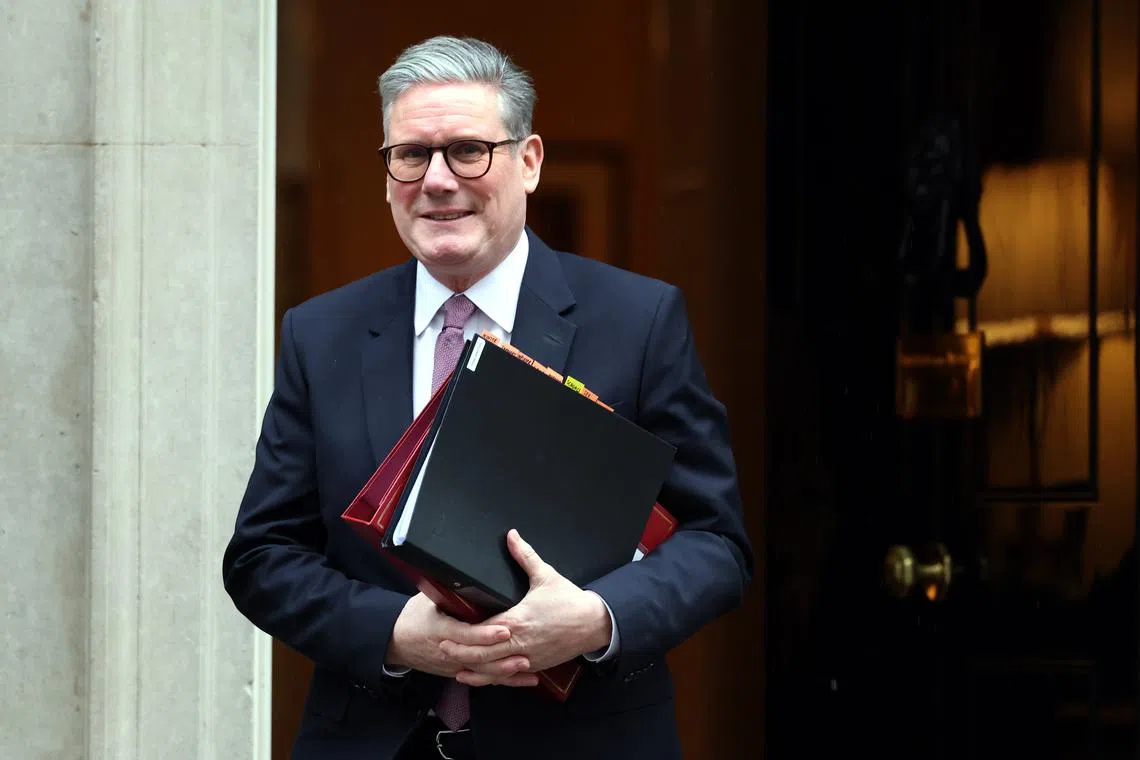British PM Starmer says only US ‘backstop’ can secure lasting peace in Ukraine
Sign up now: Get ST's newsletters delivered to your inbox

Prime Minister Keir Starmer said Britain would “play our part” in any peacekeeping role in Ukraine, but only with backup from the US.
PHOTO: EPA-EFE
WASHINGTON - British Prime Minister Keir Starmer urged the US on Feb 26 to provide a security “backstop” to any future European peacekeepers in Ukraine, saying only that would offer Kyiv a lasting peace rather than a temporary ceasefire.
Heading to Washington for a meeting with US President Donald Trump, Mr Starmer again said Britain would “play our part” in any peacekeeping role in Ukraine, but could do so only with some kind of backup from the US.
Since Mr Trump abandoned Washington’s more Ukraine-friendly approach to Russia’s war, Britain and other European nations have scrambled to demonstrate a united front and stepped up diplomatic efforts in support of Kyiv.
But there are still differences over any future deployment of troops in Ukraine, with some European nations including France ready to do so, while others, such as Poland, have ruled it out.
Russia again on Feb 26 said it could not consider “any options” for European peacekeepers being sent to Ukraine.
For Mr Starmer, the crucial part of plans for a Ukraine peace deal is securing what he calls a “backstop” from Mr Trump, something that has yet to be clearly defined.
“I’m absolutely convinced that we need a lasting peace, not a ceasefire, and for that to happen, we need security guarantees,” he told reporters travelling with him to Washington.
“Precisely what that layers up to, what that looks like, is obviously a subject of intense discussion.”
Mr Starmer said the backstop was crucial to deter Russian President Vladimir Putin from attacking Ukraine again.
“My concern is if there is a ceasefire without a backstop, it will simply give him (Putin) the opportunity to wait and to come again because his ambition in relation to Ukraine is pretty obvious, I think, for all to see,” he said.
A day after saying he would boost defence spending – meeting a demand often made by Mr Trump to members of the Nato alliance – Mr Starmer was reticent about his chances of success in Washington.
“I’m not going to get ahead of myself on it, other than to say I’m very clear about what the principles are,” he said.
Before Mr Starmer’s arrival, Mr Trump said: “I’m not going to make security guarantees beyond very much. We’re going to have Europe do that, because we’re talking about Europe as the next-door neighbour (of Ukraine).”
Starmer’s trip follows Macron’s
Mr Starmer’s trip comes on the heels of a good-humoured visit to Washington by French President Emmanuel Macron, who agreed with Mr Trump on the deployment of European peacekeeping forces.
However, Mr Macron also did not get a firm nod on the backstop idea.
Mr Starmer and his team are hoping to press on with a charm offensive that began at a two-hour dinner they shared with Mr Trump in September 2024 at Trump Tower, a meeting British officials said was warm, with the “gracious host” offering foreign minister David Lammy a second helping of chicken.
The Prime Minister said he wanted the so-called “special relationship” between the US and Britain – a term first referenced by Winston Churchill after World War II – “to go from strength to strength”.
But he will have to navigate some tricky differences.
Mr Trump blindsided Europe by calling Mr Putin without warning and sending a delegation to Saudi Arabia for talks with Russia without including Ukraine or Europe.
The US President has also called Ukrainian President Volodymyr Zelensky a “dictator” and falsely suggested that Kyiv was responsible for starting the Russia-Ukraine war.
Mr Starmer has been careful to stick to his positions – that Mr Putin started the war with the 2022 full-scale invasion of Ukraine, that Mr Zelensky is democratically elected, and that Ukraine should be involved in peace negotiations – without addressing Mr Trump’s comments directly.
He said there was “one aggressor here, and that’s Russia” and was immediately asked whether Mr Trump agreed with his thinking.
“Of course, the President has been very clear about the peace that he wants. He’s right about that. We all want peace,” Mr Starmer said. “The question is, how do we make sure it’s a lasting peace. There’s no issue between us on this.” REUTERS


